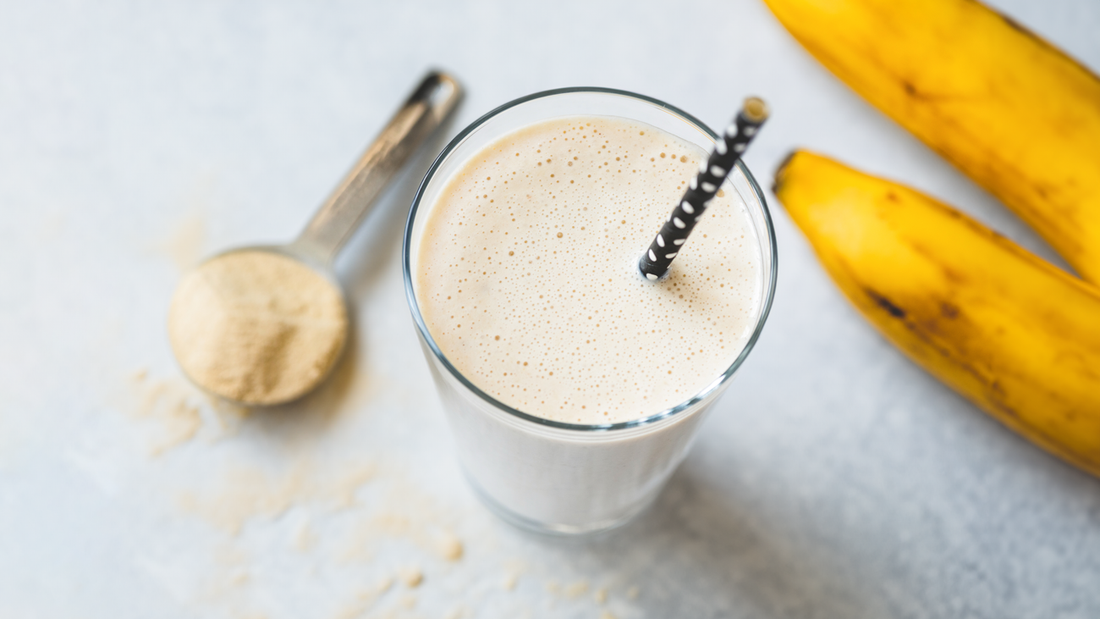
How Protein Before Sleep Could Benefit Your Health
We're all about pursuing healthy habits that are backed by science. One question that's been buzzing around the health world is: "Should we be consuming protein before bed?" If you're curious, too, let's untangle this complex web of nutritional science together.
Why is Protein a Big Deal?
Let's start with the basics. Protein is a big deal because it's essential for almost every biological process. This mighty macronutrient helps us build muscle, repair tissue, and even make vital enzymes and hormones. If you're on a journey to lose weight, maintain muscle mass, or just generally stay healthy, getting enough protein is paramount.(1,2)
Consuming a protein shake before bed could increase metabolism and energy expenditure the following day.
What Makes Consuming Protein Before Bed Beneficial?
The timing of protein intake might be a game-changer, with nighttime emerging as an intriguing option. Here's why.
Can it Be a Secret Weapon for Weight Loss?
The thermic effect of food refers to the energy our bodies use to digest, absorb, and process nutrients. Protein stands out because it has a higher thermic effect, meaning your body burns more calories digesting protein compared to fats or carbs. This can potentially boost your calorie-burning capacity and contribute to weight loss.(3)
Moreover, protein is known for its satiety-inducing powers. In simple terms, it helps you feel fuller for longer, reducing the temptation for midnight snacking, and indirectly, your overall calorie intake.(4)
A study published in the British Journal of Nutrition showed that consuming a protein shake before bed could increase metabolism and energy expenditure the following day. In other words, a pre-bedtime protein shake could set the stage for a boosted metabolism the following day.(5)
When choosing your protein powder, consider one fortified with prebiotics like green banana or psyllium husk. The effects of dietary fiber, such as prebiotics, on fullness may be more pronounced at night, according to a study in the American Journal of Clinical Nutrition(12). So a protein shake with added prebiotics could be the ideal bedtime beverage for weight management and gut health.
Can it Give a Boost to Muscle Growth and Recovery?
Muscle health is another area where pre-bedtime protein intake can shine. Protein provides your body with essential amino acids needed for muscle repair and growth during sleep, the prime time for muscle recovery.(6)
In a study published in the American Journal of Physiology, researchers found that protein consumption before sleep stimulated muscle protein synthesis (muscle growth) overnight. This means that a protein shake before bedtime could provide your muscles with a recovery boost while you get your beauty sleep.(7)
How Much Protein Should You Consume Before Bed?
We've established that the 'when' is essential, but what about the 'how much'? Here's where the waters get a little murky. One study in The Journal of Nutrition suggests about 40 grams of protein before bed to maximize muscle protein synthesis overnight.(8) However, that might feel like a lot for some people.
The Institute of Medicine recommends a daily protein intake of 46 grams for adult women and 56 grams for adult men as a general guideline. However, protein needs can vary greatly based on factors like age, sex, physical activity level, and overall health.(9) So, if 40 grams seems too much, don't worry. You can start with a smaller portion and see how your body responds. Remember, it's about finding what works best for you.
Does it Have to be a Protein Shake?
Mixing up your protein sources can make this habit more enjoyable. If the thought of chugging down a protein shake before bed doesn't excite you, consider other protein-rich snacks like a protein pudding or homemade protein balls. The idea is to consume a good source of protein, not necessarily a shake.
Protein intake before bed offers fascinating benefits for muscle growth and metabolism. It's a nutritional shift worth considering for those seeking to boost their health.
Sources:
(1) Wu, G. (2016). "Dietary protein intake and human health". Food & Function, 7(3), 1251-1265.
(2) Pasiakos, S. M., McLellan, T. M., & Lieberman, H. R. (2015). "The effects of protein supplements on muscle mass, strength, and aerobic and anaerobic power in healthy adults: a systematic review". Sports Medicine, 45(1), 111-131.
(3) Pesta, D. H., & Samuel, V. T. (2014). "A high-protein diet for reducing body fat: mechanisms and possible caveats". Nutrition & Metabolism, 11, 53.
(4) Leidy, H. J., Tang, M., Armstrong, C. L., Martin, C. B., & Campbell, W. W. (2011). "The effects of consuming frequent, higher protein meals on appetite and satiety during weight loss in overweight/obese men". Obesity, 19(4), 818-824.
(5) Kinsey, A. W., Ormsbee, M. J. (2015). "The health impact of nighttime eating: old and new perspectives". Nutrients, 7(4), 2648–2662.
(6) Tipton, K. D., & Wolfe, R. R. (2001). "Exercise, protein metabolism, and muscle growth". International Journal of Sport Nutrition and Exercise Metabolism, 11(1), 109-132.
(7) Res, P. T., Groen, B., Pennings, B., Beelen, M., Wallis, G. A., Gijsen, A. P., ... & Van Loon, L. J. (2012). "Protein ingestion before sleep improves postexercise overnight recovery". Medicine and Science in Sports and Exercise, 44(8), 1560-1569.
(8) Trommelen, J., & van Loon, L. J. (2016). "Pre-Sleep Protein Ingestion to Improve the Skeletal Muscle Adaptive Response to Exercise Training". Nutrients, 8(12), 763.
(9) Institute of Medicine (US) Committee on Military Nutrition Research. (1999). The Role of Protein and Amino Acids in Sustaining and Enhancing Performance. Washington (DC): National Academies Press (US).





